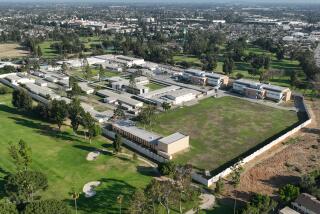Students Get Into a New High--It’s Named Recovery : Teen-agers with drug or alcohol problems attend nation’s first public school for those battling substance abuse.
- Share via
ALBUQUERQUE — “What are five differences between pot and alcohol?”
Therapist Al Sanchez stands before a classroom full of teen-agers, a blue marker poised expectantly to jot down their answers.
“Alcohol is bad for your liver,” one student calls out. “You don’t get the munchies when you drink,” adds another, to snickers from the others. The kids join in enthusiastically, interrupting one another with suggestions until the list of differences has grown to seven.
Sanchez shakes his head in disagreement and scrawls a single word on the board: “BULL.”
His point is that the supposed distinctions matter little. “A drug is a drug is a drug,” he tells them.
It might be a health class in any American high school in the 1990s, but here there is a difference. Each of these students already has a serious drug or alcohol problem, and each has volunteered to attend Recovery High, the nation’s first public school for kids coping with substance abuse.
The school is staffed by teachers, therapists and medical professionals. They use a variety of approaches to help teen-agers who have been through drug detoxification walk the rocky road to permanent sobriety. The goal is to return these students to their old schools and friends with a better chance of withstanding the temptation to resume drinking or taking drugs.
“We’re not dealing necessarily with kids who are addicted,” says Jan Hayes, the school’s principal. “We are dealing with kids who have a history of substance abuse. And there is a difference between addiction and abuse.
“The focus of Recovery High is to give kids an extended after-care program,” Hayes says. “We don’t do detox, so we can’t handle a student who’s in a critical stage of his abuse.”
What the year-round school does provide, in addition to standard academic courses, is personal counseling, daily Alcoholics Anonymous-style 12-step meetings, art therapy, and such outdoor therapy as a rock climbing and ropes course that lets students test their own limits and confront their fears.
“It requires that people trust each other and that they communicate,” says outdoor therapist Brian Stricker.
Such programs help make students and staff one “community,” where veteran students act as mentors for newcomers and help them deal with their substance abuse problems.
Recovery High, which opened in renovated office space last February, has 13 students, but Hayes predicts that by October the school will reach its 100-pupil capacity. The six boys and seven girls now enrolled have acknowledged abusing alcohol, marijuana, heroin, cocaine or amphetamines, Hayes says. At least one has been a dealer, and all have abused more than one substance.
A group called Parents Against Drugs got Recovery High started by forming a nonprofit board and securing $800,000 in funding from the Robert Wood Johnson Foundation for the first 18 months of operation. The Albuquerque Public Schools System has contributed an additional $267,000 in matching funds.
The staff of 12 also includes an intervention coordinator, three therapists, a physician, a nurse-practitioner, three teachers, an office manager and a custodian. The school also has a medical clinic, whose main purpose is to provide primary care and treat students for health effects of their drug or alcohol use.
Youngsters may be referred to Recovery High by school counselors, residential drug treatment programs or probation officers, but to gain admission they must agree to abide by strict rules.
Students may not leave the building during school hours: 8 a.m. to 4:30 p.m. They may not smoke and cannot wear gang colors or caps. Clothing that is sexually provocative or refers to drugs or alcohol is forbidden.
They also must stay off drugs and submit to random drug tests. To build trust, Recovery High staff members also take drug tests. “If we’re asking a kid to do something,” Hayes says, “then we need to be willing to do it, too.”
The staff knows some students will occasionally fall off the wagon. “Relapse is a common occurrence in recovery,” Hayes says. “If we see a relapse, we have an issue we have to deal with.”
Students and their parents, many of whom have their own drug or alcohol problems, sign a contract agreeing to follow the rules and to weekly family therapy sessions.
“When they read that contract and the schedule, you can tell from the look on their faces and the next words out of their mouths whether they’ll go for it,” Hayes says.
More to Read
Sign up for Essential California
The most important California stories and recommendations in your inbox every morning.
You may occasionally receive promotional content from the Los Angeles Times.













